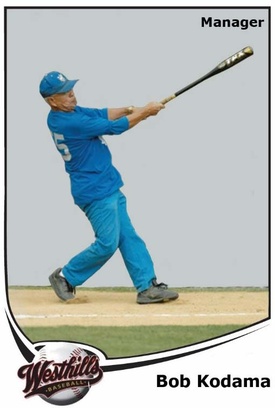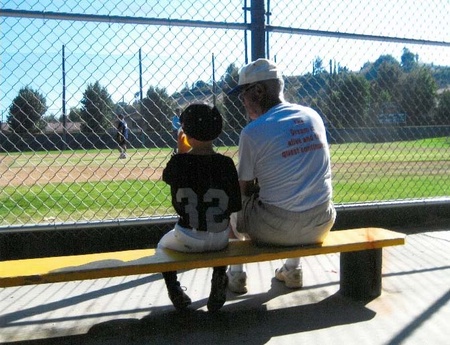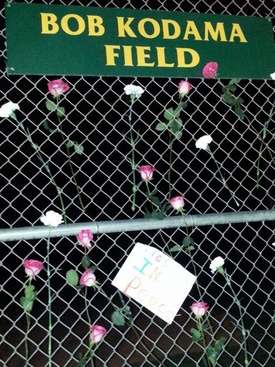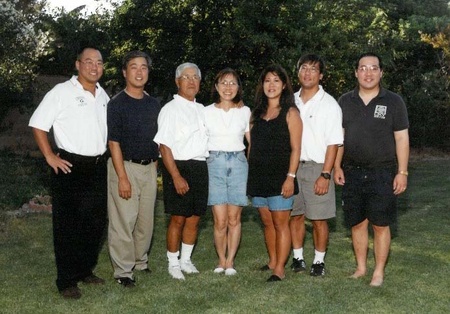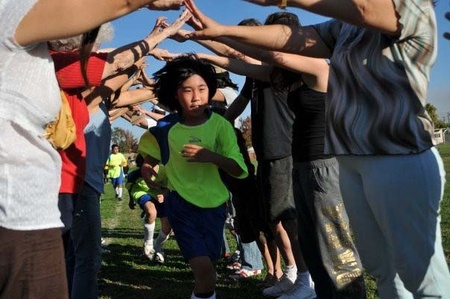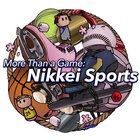My Father, Bob Seiko Kodama, was a Nisei born in Seattle, Washington in 1931. His parents operated hotels in Downtown Seattle. He spent the early part of his life exploring the waterfront. In 1942, along with 120,000 other Japanese Americans, Bob and his family were rounded up and sent to an internment camp. His family was sent to Minidoka, Idaho. It is hard to imagine what it is like to be 10 years old and be locked up by your country for how you look. While at Minidoka, Bob learned how to play baseball. He became good enough that when he returned to Seattle after World War Two, he made the varsity baseball team at Garfield High School and even played in the City Championship Game at Sicks Stadium.
My Dad’s love for sports was passed on to his children. Growing up in the San Fernando Valley in Los Angeles, all of us participated in sports during our childhood. When I was nine years old, I signed up to play baseball and during tryouts, demonstrated that I would be one of the WORST players in the league. My first-time playing catch with my Dad—I missed the ball and it hit me smack in the face. Not a good start.
During this time, my Dad was laid off of work and…he picked me up every day after school to play baseball. I remember he brought me a snack and a drink and we would go to the local park to hit, field, and run the bases until dark. He threw batting practice for me measured in buckets of baseballs. I learned to hit line drives. Being left handed, my Dad taught me to bunt—I learned how to bunt so well that I could get on base every time. While it was getting dark, it became a challenge to see the ball. We always ended these sessions with my Dad hitting fly balls in the dusk. As I became better at catching flyballs, I would come in closer and challenge him to hit it over my head, imagining that I was Willie Mays or Mickey Mantle going back and making a tremendous catch to win a game. He taught me everything about baseball and I became pretty good at it.
The next year, I signed up to play baseball again. This time, my Mother told the baseball coach that my Dad played baseball and would help him. Little did we know that this was the start of my Dad’s second career. Coaching became his passion. My Dad coached us in baseball and basketball. He helped out with our soccer teams, too. As a manager, coach, and assistant coach, his teams won over 30 league championships.
When I was 16 years old, I became head coach of a local soccer team and asked my Dad to be my Assistant Coach. It was one of the greatest experiences of my life—can you imagine being 16 years old and telling your Father what to do??? He was a great assistant coach. One of my first lessons he taught me was how to deal with parents. The first time, a parent complained to him, he kindly told him to talk to the head coach (me). We spent many hours preparing for practices and games. He prepared detailed scouting reports on every team in the league and helped me to develop a game plan every week.
The next year, he asked me to help him coach baseball. He gave me responsibilities such as showing left-handed hitters how to bunt, teaching his team how to run the bases, and working with the outfielders on all parts of the game. My Dad taught me about the importance of every single player on the team. During these games, I coached first base and my Dad coached third base. We could work the double steal to perfection.
Even after we became adults and finished playing youth sports, my Father continued to coach others, eventually coaching some of his grandchildren, too. My Father was intense and studied every game. He believed that we learned life lessons while playing sports. He said, “the only kid who never makes a mistake is the kid who doesn’t do anything.” He pushed hard and believed in maximum effort. If we failed, then get back up again. (“Get back on the horse.”)
His secret to coaching? Maximum effort and getting the most out of every player. Every year, we found boys who were underrated and undervalued—these became the core of every successful team. While he won a lot of games, I believe it was the pursuit of excellence that was even more important. He studied others and was always trying to learn more about the game. We spent countless hours talking about sports and coaching. Every season, we reviewed and talked about what went right and what went wrong and how we could improve ourselves as coaches.
Eventually, I became a high school soccer coach. So did two of my brothers. The lessons we learned growing up playing for my Father, were now ingrained in us and taught to the next generation of athletes. At then end of every season, I always had multiple sessions with my Father and other coaches so that I would learn from my mistakes and become a better coach next season.
When my Father passed away in 2014, my brother Rob and I wanted to recognize our Father with a celebration of life that included his legacy in sports and as a youth coach. We are proud that West Hills Boys Baseball named a field after my Father and that El Camino High School set up the Bob Kodama Scholarship Fund to help varsity El Camino Real baseball players who need financial help. Many of his players at West Hills Baseball became varsity players at El Camino High School and other high schools. Some went on to play college baseball and even became major league baseball players.
My Father loved to tell stories about his favorite players such as Lou Gehrig and Jackie Robinson. It was fitting that we talked about the impact of coaches, quoting Jackie Robinson who said, “A life is not important except in the impact it has on others.” Both my Father and I cherish the relationships we formed with our players – many who came back to say hello and talk about their times as players. It is difficult to put into words how much this means. Coaches and their families make tremendous sacrifices that go unnoticed and are not always appreciated. I truly value the alumni who come back and say hello. Many also became coaches, too.
I think our Father had an impact on so many people—often in ways beyond our wildest expectations. I think this is why he coached and what drove him to coach from the 1970s on until 2011. When my Father died, West Hills Baseball posted a tribute saying,
“For over 30 years, Bob personified everything any parent could dream of in a coach and mentor, and exemplified all we strive for at our league. Still indebted to his service and the example he set, our Bronco field was named in his honor.”
“Bob coached generations of players, including those from his family, and contributed so much to the lives of so many children and families in our community. He made us all the better for knowing him and spending time with him. He will be dearly missed but never forgotten.”
So why coach? Why give so much time and effort?
As I mentioned, I coached high school soccer for over 30 years. We won 11 league titles along the way. Still, the most important thing is the journey and the student athletes. I am lucky and still keep in contact with many players and their families. This past year, my son Mitchell became the head coach and I had the privilege of helping him as an assistant coach. He hired two phenomenal assistant coaches who had also played high school soccer at Burroughs. Working with them this past year was a rewarding experience. I enjoyed being part of the staff and helping them to learn how to coach. They did well—and earned the respect of other teams and coaches. Referees commented about them and appreciated their maturity and saw them as future coaches of America.
So why coach?
At the end of the season, the school went in a different direction and hired a new soccer coach. The most difficult part was talking with the coaching staff and telling them that we were no longer going to coach the high school teams. What was amazing was that the entire coaching staff did not talk about themselves but rather focused on the returning student athletes and expressed their concern for them. It was all about the kids. This is why we coach. It is a gift to be able to give and have an impact on others. It is a gift to be able to teach life lessons through sports. Perhaps that is the most important lesson that I was given by my Father through sports, who said, “everything in life you can learn from baseball.” Expanding that thought—“you can learn a lot about life from sports.”
Perhaps that is why we coach. The next time, you are at a youth sporting event, think of the coach. While you may not agree with them, think of the time and dedication it takes to prepare for practices and games, think of the effort that they put in to create positive experiences for our youth. While you as a parent can focus on one child—the coach has to work with the entire team. If you are a coach—think of your impact on lives.
I recently had a former player talk to me about social justice and he could not understand why we can’t get along and work together—like we did when he played high school soccer. You are teaching valuable lessons that can last a lifetime. Perhaps this explains why people would become a coach and why my father, Bob Kodama dedicated his life to coaching youth sports. Yes—he loved sports and was very competitive and loved to win—but it was much more than winning that brought my Dad back year after year to coach youth sports.
* * * * *
Our Editorial Committee selected this article as one of his favorite More Than a Game: Nikkei Sports stories in English. Here is the comment.
Comment by Brian Niiya
Michael Kodama’s moving tribute to his father, Bob Seiko Kodama, and to the role sports and coaching played in their lives captures much about the importance of sports in general as well as in the Japanese American community. Bob learns to play baseball while incarcerated at Minidoka as a child, and coaching baseball and other sports becomes a core of the father-son relationship that even continues on to the next generation. Kodama’s story highlights the best aspects of sports and coaching and the role it has played in the lives of generations of young people, while also noting the reasons his father and others choose to serve as coaches. I hope his story inspires others to take up this noble calling.
© 2020 Michael Kodama


